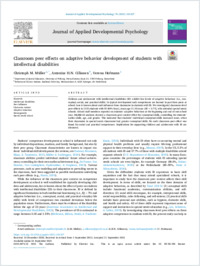Classroom peer effects on adaptive behavior development of students with intellectual disabilities
IPC
- Müller, Christoph Michael ORCID Department of Special Education, University of Fribourg, Petrus-Kanisius-Gasse 21, 1700 Fribourg, Switzerland
- Cillessen, Antonius H. N. ORCID Behavioural Science Institute, Radboud University, Montessorilaan 3, 6525 Nijmegen, the Netherlands
- Hofmann, Verena ORCID Department of Special Education, University of Fribourg, Petrus-Kanisius-Gasse 21, 1700 Fribourg, Switzerland
- 2021
Published in:
- Journal of Applied Developmental Psychology. - 2021, vol. 76, p. 101327
Intellectual disabilities
Peer infuence
Classroom context
Adaptive behaviors
Heterogeneity
Special needs school
English
Children and adolescents with intellectual disabilities (ID) exhibit low levels of adaptive behaviors (i.e., conceptual, social, and practical skills). In typical development such competences are learned in part from peers at school. Less is known about such influence from classmates in students with ID. We investigated classroom-level peer effects in 1125 students with ID (69% boys), mean age 11.30 years (SD = 3.75), who attended special needs schools. School staff members reported on students’ adaptive behaviors at the beginning and end of one school year. Multilevel analyses showed a classroom peer context effect for conceptual skills, controlling for students’ earlier skills, age, and gender. This indicated that students’ individual conceptual skills increased more, when their classmates in special needs classrooms had greater conceptual skills. No such classroom peer effect was found for social and practical competences. Implications for supporting children and adolescents with ID are discussed.
- Faculty
- Faculté des lettres et des sciences humaines
- Department
- Département de Pédagogie spécialisée
- Language
-
- English
- Classification
- Special education
- Other electronic version
- License
- CC BY-NC-ND
- Open access status
- green
- Identifiers
- Persistent URL
- https://folia.unifr.ch/unifr/documents/320010
Statistics
Document views: 42
File downloads:
- mueller_et_al_2021_classroom.pdf: 352
